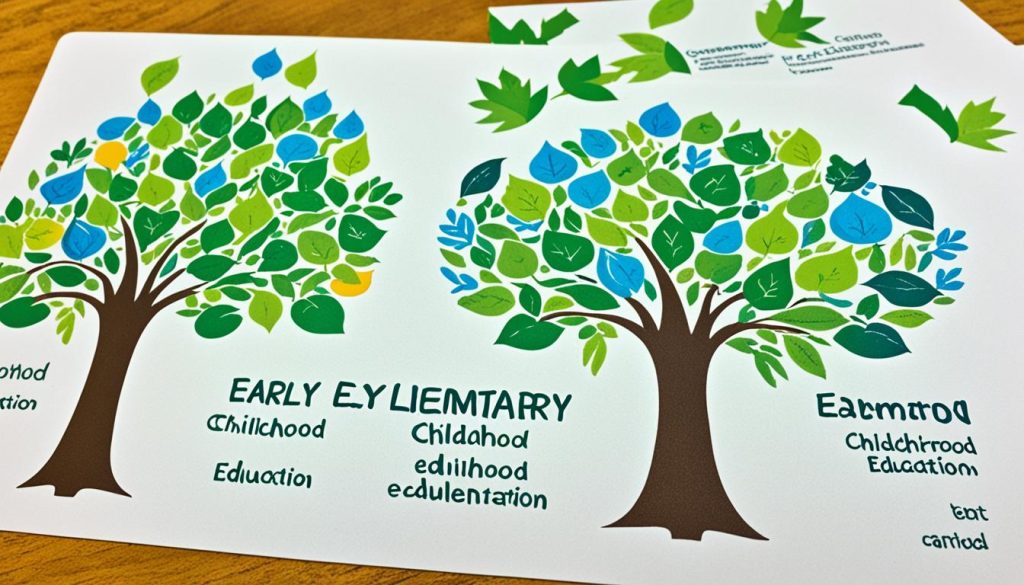When looking to pursue a degree in early childhood education in Ohio, it’s important to choose a reputable and accredited online college. Intelligent.com has compiled a comprehensive list of the top online early childhood education degree programs in Ohio, providing aspiring educators with the knowledge and insights to make an informed decision.
These programs offer flexible learning options, including online coursework and in-person components, such as student teaching. The curriculum typically focuses on child development, teaching strategies, curriculum planning, and classroom management. Students can choose from various degree levels, including associate’s, bachelor’s, master’s, and doctoral degrees. Additionally, specialization options are available, such as language development, curriculum and teaching methods, STEAM education, special education, and social and emotional learning.
Key Takeaways:
- Choosing a reputable and accredited online college is crucial for pursuing a degree in early childhood education in Ohio.
- Online early childhood education degree programs offer flexible learning options, including online coursework and in-person components like student teaching.
- The curriculum focuses on child development, teaching strategies, curriculum planning, and classroom management.
- Various degree levels are available, including associate’s, bachelor’s, master’s, and doctoral degrees.
- Specialization options in early childhood education include language development, curriculum and teaching methods, STEAM education, special education, and social and emotional learning.
What Can I Expect from an Online Early Childhood Education Degree Program?
Online early childhood education degree programs provide a flexible and accessible pathway for aspiring educators to shape young minds while balancing their personal and professional commitments. These programs offer a comprehensive curriculum that focuses on important aspects of child development, teaching strategies, assessment and evaluation, and classroom management. While most of the coursework is completed online, there are also valuable in-person components, such as student teaching, to provide hands-on experience and practical application of knowledge.
When you enroll in an online early childhood education degree program, you can expect to explore various curriculum elements that will help you develop a deep understanding of child development and effective teaching practices. The coursework is designed to equip you with the necessary skills to create nurturing environments for young learners, plan engaging curriculum, and implement effective teaching methods.
Here are some key components that you can expect to encounter in an online early childhood education degree program:
- Child development: You will delve into the various stages of child development, understanding the physical, cognitive, social, and emotional milestones that children experience.
- Teaching strategies: You will learn evidence-based teaching strategies and approaches that promote active learning and cater to the diverse needs of young learners.
- Assessment and evaluation: You will gain insights into different assessment methods and strategies to effectively evaluate the progress and development of young children.
- Classroom management: You will acquire skills in creating supportive and inclusive learning environments, managing behavior, and fostering positive relationships with students, parents, and colleagues.
- Remote learning: With the increasing prevalence of remote learning, you will also explore how to adapt your teaching strategies and utilize technology to engage and facilitate meaningful learning experiences for young children.
Here is an illustrative table showcasing a sample schedule for an online early childhood education degree program:
| Course | Credit Hours | Description |
|---|---|---|
| Child Development | 3 | An in-depth exploration of the physical, cognitive, social, and emotional development of children from birth to age 8. |
| Teaching Methods | 4 | An examination of effective teaching strategies and instructional approaches that support optimal learning outcomes for young children. |
| Curriculum Planning | 3 | A focus on designing developmentally appropriate and engaging curriculum that meets the needs and interests of young learners. |
| Assessment and Evaluation | 3 | An exploration of various assessment methods and strategies for evaluating children’s learning and development. |
| Classroom Management | 3 | Developing effective classroom management strategies, fostering positive behavior, and promoting a positive learning environment. |
Throughout your online learning journey, you’ll have access to dedicated faculty and resources that will support your growth and development as an early childhood educator. Online discussions, virtual collaboration, and interactive learning platforms will enhance your engagement and ensure a dynamic learning experience.
By choosing an online early childhood education degree program, you are embarking on a fulfilling journey to mold and inspire young minds, making a lasting impact on their lives and futures.
The Difference Between Early Childhood Education and Elementary Education
Early childhood education and elementary education are two distinct phases in a child’s educational journey. Each phase caters to a specific age group and has a different curriculum focus.
Early childhood education typically encompasses children from birth to around eight years old. During this phase, the emphasis is on fostering social and emotional learning, fine and gross motor skills development, and early cognitive development.
Elementary education, on the other hand, starts around the age of six and continues through the primary school years. This phase focuses more on academic subjects such as math, science, and literacy, while still considering aspects of social and emotional development.
Understanding the difference between these two phases is crucial when choosing a degree program in education. It will determine the age group you will be working with and the curriculum focus of your studies. Whether you are passionate about nurturing young children in their early years or teaching academic subjects to older students, selecting the right program aligns with your interests and career goals.

| Early Childhood Education | Elementary Education | |
|---|---|---|
| Age Group | Birth to around eight years old | Around six to twelve years old |
| Curriculum Focus | Emphasizes social and emotional learning, fine and gross motor skills development, and early cognitive development. | Focused on academic subjects such as math, science, and literacy, with consideration for social and emotional development. |
Types of Degrees and Specialization Options in Early Childhood Education
Early childhood education offers a range of degrees and specialization options to suit individual career goals and interests. Whether you aspire to work as a preschool teacher, program coordinator, or even pursue research or teaching at a university level, there’s a degree pathway that aligns with your ambitions.
1. Associate’s Degree:
An associate’s degree in early childhood education provides the foundational knowledge and practical skills necessary for roles such as preschool teacher assistants or childcare providers. This degree equips you with a solid understanding of child development and the ability to create nurturing environments for young learners.
2. Bachelor’s Degree:
A bachelor’s degree expands upon the knowledge gained in an associate’s degree and offers a deeper understanding of child development, curriculum planning, and classroom management. With a bachelor’s degree in early childhood education, you can pursue positions such as preschool or kindergarten teachers, program coordinators, or directors of childcare centers.
3. Master’s Degree:
For those seeking leadership positions in the field of early childhood education, a master’s degree is a valuable asset. With this advanced degree, you can pursue roles such as early childhood education administrators, curriculum specialists, or researchers. A master’s degree allows for a comprehensive understanding of educational theory, research, and the latest teaching methodologies.
4. Doctoral Degree:
If you have a passion for research, policy influence, or aspire to teach at the university level, a doctoral degree in early childhood education is the path for you. With a doctoral degree, you can contribute to the field through groundbreaking research, shaping policies that impact early childhood education, and educating future educators.
Specialization Options:
Within the field of early childhood education, there are several specialization options to help you align your academic experience with your career goals and provide targeted support to young learners. Some specialization options include:
- Language Development
- Curriculum and Teaching Methods
- STEAM Education (Science, Technology, Engineering, Arts, and Mathematics)
- Special Education
- Social and Emotional Learning (SEL)
Choosing a specialization allows you to dive deeper into a specific area of interest and gain the expertise needed to make a significant impact within that field.

“Education is not the filling of a pail, but the lighting of a fire.” – William Butler Yeats
Obtaining a State-Level Teaching Certification in Early Childhood Education
To become a licensed teacher in the United States, a bachelor’s degree is typically required. Each state has its own teaching certification criteria, which may include specific coursework, student teaching, and exams. It is advisable to attend a school in the state where you plan to teach to ensure that you meet the specific requirements for teaching certification. However, some states have reciprocity agreements that recognize teaching credentials from other states, so it’s essential to check with the program to ensure that your teaching certification will be valid in your state.
The specific criteria for teaching certification vary, but a bachelor’s degree is a common requirement.
Conclusion
Concluding our exploration of online colleges in Ohio for early childhood education, pursuing a degree in this field from an accredited online college in Ohio is a transformative journey for aspiring educators. It equips them with the necessary knowledge and skills to shape young minds and make a lasting impact on future generations.
These online programs provide the flexibility and accessibility that working professionals need, offering a combination of online coursework and valuable in-person components, such as student teaching. This hybrid approach ensures that students gain practical experience and apply their learning in real educational settings.
With various degree levels and specialization options available, students can tailor their education to align with their career goals and interests. However, it’s crucial to consider the state-level teaching certification requirements when choosing a program. This ensures that graduates meet the eligibility criteria to teach in their desired state.
By earning a degree in early childhood education from an accredited online college in Ohio, educators can embark on a rewarding career path. They have the opportunity to shape young minds, nurture their development, and make a difference in the field of education. With dedication and passion, they can contribute to creating a brighter future for our children and society as a whole.




No comments! Be the first commenter?